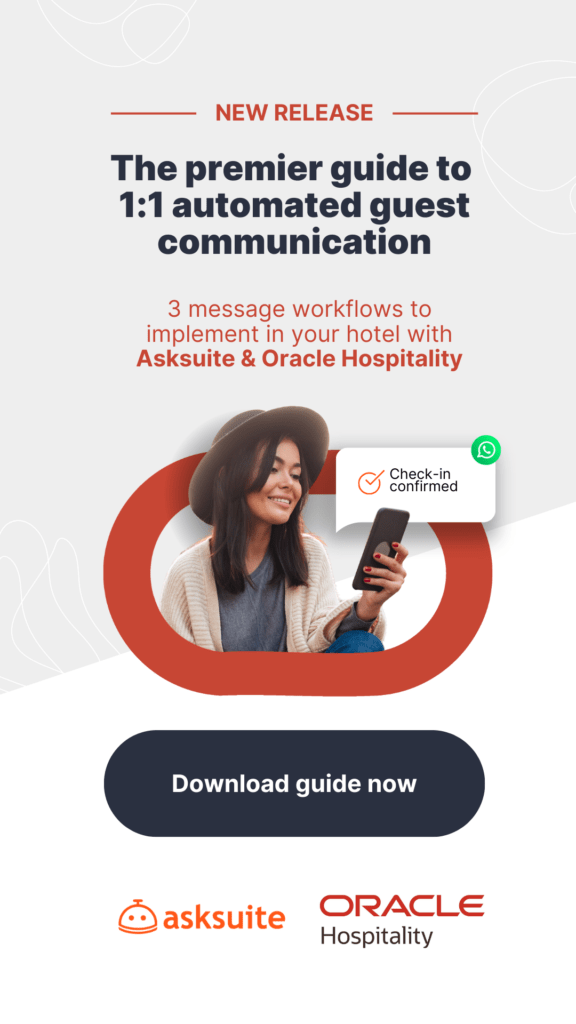The hospitality industry is constantly evolving, and hotels are now expected to provide guests with exceptional experiences both on and offline. This means that having a solid omnichannel communication strategy in place is more important than ever.
An omnichannel communication strategy refers to a comprehensive approach that guarantees consistent messaging across various communication channels used by a hotel, such as social media, email, chat, and phone. This approach aims to create a seamless and uniform guest experience across all channels.
In this blog post, we’ll dive into why an omnichannel communication strategy is essential for hotels, and how you can implement one to improve your customer service.
Why an Omnichannel Communication Strategy Matters
First and foremost, an omnichannel communication strategy helps hotels provide a more seamless guest experience. Guests expect to be able to communicate with hotels through multiple channels, and they want those interactions to be consistent.
For example, if a customer messages a hotel on social media, they expect the same level of service as if they had called the hotel. If a potential guest calls the hotel to book a room, they expect to be able to follow up on their reservation via email. When guests have a consistent experience across all channels, they feel valued and taken care of, which leads to better reviews and increased loyalty.
Another benefit of an omnichannel communication strategy is that it allows hotels to gather data on guests. By tracking how guests interact with a hotel on different channels, hotels can gain insights into what their guests want and need. This data can then be used to improve the guest experience and tailor messaging to better meet their needs.
Implementing an Omnichannel Communication Strategy
Now that you understand the benefits of an omnichannel communication strategy and how to choose the right channels, let’s dive into how to implement it effectively:
Define Your Objectives
Start by defining your objectives for an omnichannel communication strategy. This may include increasing guest satisfaction, reducing response times, or improving data collection. By defining your objectives, you can ensure that your communication efforts align with your hotel’s goals.
Choose the Right Platform
Choosing the right platform is crucial for an effective omnichannel communication strategy. Asksuite is an omnichannel service platform that allows you to manage all your communication channels in one place, streamlining your communication efforts and providing a seamless guest experience.
Train Your Staff
To provide a consistent experience across all channels, it’s essential to train your staff on how to use the omnichannel platform and how to communicate effectively with guests through various channels. This includes providing guidelines for tone and language and ensuring that all staff members are familiar with the platform’s features.
Collect Guest Data
Collecting guest data is essential for personalizing communication and providing a more seamless experience. Use surveys, reviews, and social media listening to collect guest data and analyze it to understand your guests’ preferences and behavior.
Personalize Communication
Use the guest data you collect to personalize your communication across all touchpoints. This may include tailoring your messaging to highlight certain amenities or services or addressing guests by name to make them feel valued. Ensure that all messaging is consistent. This means using the same tone of voice, language, and branding across all channels.
Integrate Your Channels
Integrating all your communication channels is essential for a seamless guest experience. Asksuite allows you to manage all your communication channels in one place, making it easy to switch between channels and provide a consistent experience.
Why an Omnichannel Service Platform is Key
While it’s possible to implement an omnichannel communication strategy without a central platform, using one can significantly improve the guest experience. An omnichannel service platform allows hotels to manage all guest interactions from one place, ensuring that messaging is consistent and that guests receive a seamless experience.
Additionally, an omnichannel service platform allows hotels to automate certain interactions, such as sending confirmations or following up after a guest’s stay. This saves time and ensures that guests receive the same level of service, regardless of whom they interact with at the hotel.
In conclusion, an omnichannel communication strategy is crucial for hotels looking to provide a seamless guest experience. By ensuring that messaging is consistent across all channels, hotels can improve guest satisfaction, increase loyalty, and gather valuable insights into guest behavior.
Investing in an omnichannel service platform is a smart move for hotels looking to stay competitive in the industry. With guests expecting more personalized and efficient experiences, an omnichannel service platform can help hotels meet those expectations while also increasing efficiency and reducing costs.
Furthermore, by implementing an omnichannel communication strategy, hotels can stay ahead of the curve and differentiate themselves from competitors who may not be prioritizing this aspect of the guest experience. In today’s digital age, where guests have countless options when it comes to booking accommodations, hotels need to stand out in any way they can.




